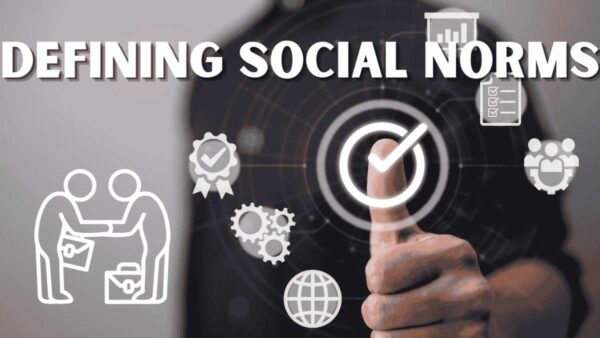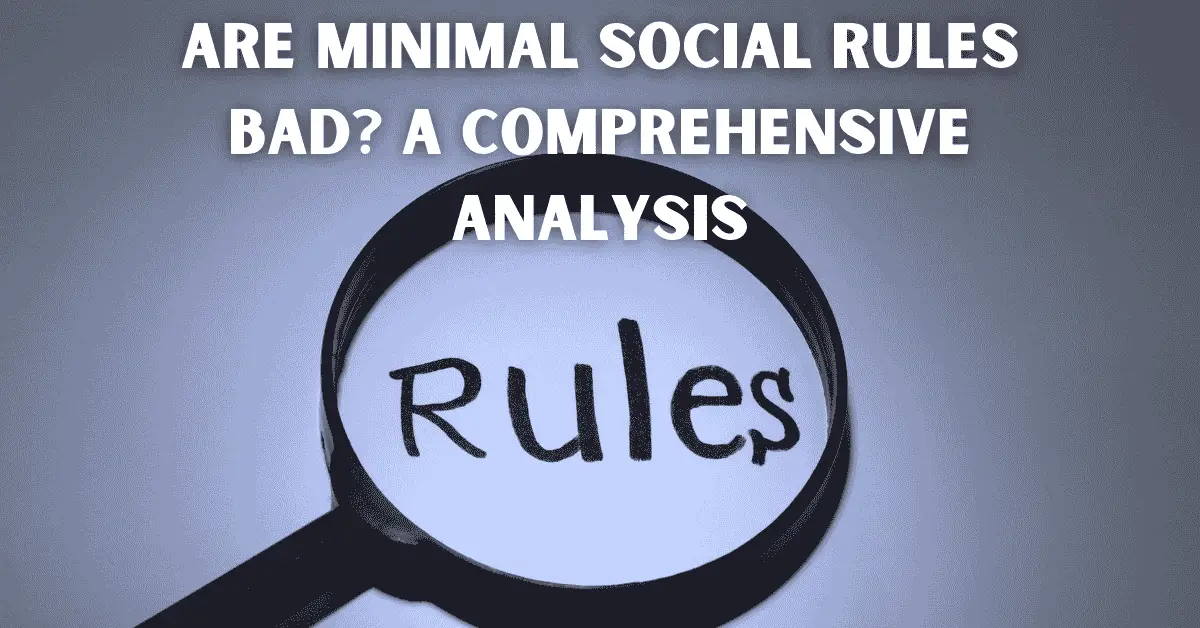Social norms are fundamental to the structure and stability of society, yet the question persists: are minimal social rules bad? This article provides a thorough analysis of the effects of reduced social regulation, discussing both its potential benefits and inherent risks. Our objective is to present a balanced, research-based perspective for policymakers, academic scholars, and community leaders.
Introduction
Evaluating whether minimal social rules are detrimental requires careful consideration of both the advantages and challenges. Social norms establish order, facilitate cooperation, and contribute to a predictable environment. Conversely, reducing these guidelines may foster greater individual freedom and innovation. In this discussion, we analyze the implications of minimal social rules on societal cohesion, personal accountability, and community welfare, ultimately addressing the complex debate: are minimal social rules bad?
Defining Social Norms

Social norms consist of the implicit guidelines that govern our interactions and behavior. They encompass a range of practices—from etiquette in interpersonal communication to culturally specific traditions—that promote respect and predictability. For example, the simple act of greeting one another or waiting for a group to commence a meal exemplifies the norms that underpin daily interactions. Although often unspoken, these practices are essential for maintaining a structured and orderly society.
The Role of Social Norms in Society
Social norms play a critical role in facilitating cooperation and ensuring collective stability. They establish clear expectations for behavior, thereby reducing uncertainty in social interactions. Key functions of social norms include promoting cooperation, ensuring predictability, and enhancing community cohesion. The inquiry into are minimal social rules bad is significant because it directly influences the efficiency and harmony of societal operations.
Advantages of Minimal Social Rules
Proponents of reduced social regulations argue that a minimalist approach can yield several notable benefits. A society with fewer prescribed norms may grant individuals greater autonomy, enabling personal expression and the exploration of diverse perspectives. This increased freedom often leads to enhanced creativity and innovation, particularly in environments where individual expression is highly valued. Moreover, reduced constraints can stimulate creative thinking and act as a catalyst for breakthroughs in art, technology, and business. Minimal social rules may also promote individualism by allowing people to assert their unique identities and challenge outdated norms, thereby fostering progressive social change.
Disadvantages of Minimal Social Rules
Despite these potential benefits, there are significant concerns associated with minimal social rules. Reduced guidelines can lead to diminished cooperation, as individuals may struggle to coordinate actions effectively, ultimately weakening social bonds and eroding trust. Additionally, the absence of robust norms may encourage behaviors that undermine community welfare, such as dishonesty or aggression. Without clear expectations, accountability may be reduced, leading to a gradual erosion of public trust and compromising the integrity of social interactions.
Empirical Evidence and Case Studies
A closer examination of real-world scenarios provides valuable insights into the debate on are minimal social rules bad. Digital communities, for instance, often operate with minimal regulation; while this environment can foster free expression and creativity, it sometimes results in issues such as cyberbullying and trolling. In densely populated urban areas, insufficient oversight may lead to public disorder, including vandalism and decreased safety. Conversely, artistic communities frequently thrive under fewer restrictions, as the emphasis on creativity and innovation can yield significant cultural and economic benefits. However, even in these settings, some degree of structure remains necessary to ensure constructive dialogue.
Striking the Optimal Balance
The central challenge is to achieve a balanced framework that harmonizes individual freedom with collective order. Rather than eliminating social rules altogether, societies should focus on developing flexible, adaptive guidelines that evolve with changing cultural and economic conditions. Adaptive guidelines offer the advantage of being both clear and modifiable, accommodating new ideas while promoting accountability and cooperation. Effective strategies include implementing adaptive policies, promoting accountability, facilitating community engagement, and respecting cultural diversity.
The Influence of Cultural Context
The effectiveness of minimal social rules is deeply influenced by cultural context. In many Western societies, where individual liberty is highly prized, a minimalist approach may be more acceptable. In contrast, cultures that emphasize collective well-being often rely on established norms to maintain social order. Therefore, the question of are minimal social rules bad must be evaluated within the framework of each cultural context.
Psychological Perspectives
Psychological research underscores the importance of social norms in promoting prosocial behavior. Clear expectations provide security and motivate individuals to act responsibly. Minimal rules may reduce the pressure to conform, fostering creativity but potentially decreasing overall accountability. Striking a psychological balance is essential for maintaining both individual satisfaction and societal stability.
Economic and Political Implications
The impact of minimal social rules extends into economic and political realms. Economically, reduced regulation can stimulate growth and innovation; however, if ethical standards are compromised, market failures may occur. Politically, clear social norms are vital for governance and public trust. Policymakers must balance deregulation with the need for structured oversight to ensure stability and fairness.
Weighing the Evidence
After a detailed examination, it is clear that the effects of minimal social rules are multifaceted. They offer significant advantages, such as increased freedom, creativity, and individualism, but they also pose risks, including reduced cooperation, increased antisocial behavior, and diminished accountability. The evidence suggests that a balanced approach—integrating flexible, adaptive guidelines with robust mechanisms for accountability—is the most effective strategy for achieving both personal liberty and social order.
Conclusion
Determining whether are minimal social rules bad requires a nuanced, balanced perspective. While reduced social regulation can foster greater freedom and innovation, it may also compromise social cohesion and accountability. The optimal solution lies in striking a delicate balance that supports both individual expression and community stability. By implementing adaptive guidelines and encouraging community engagement, societies can harness the benefits of minimal regulation while mitigating its inherent risks. This balanced approach is essential for fostering long-term stability and progress in a rapidly evolving world.
- Protected: Custom Software Solutions by Mubeen – Smart Tools for Your Business Password (3640511)
- Where to Buy NeuroGum in Australia – Boost your focus and Energy by taking Nootropic Mints
- NeuroGum Australia Where to Buy for Fast Local Delivery
- Living in India vs USA: A Comprehensive Comparison
- How Much Does a Transmission Weigh? A Technical Overview

